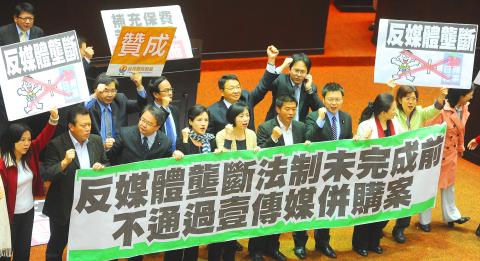|
KMT rejects bid to
halt media selloff
CONCERNSO pposition lawmakers said a deal to
sell Next Media’s Taiwanese assets was contrary to the International Covenant on
Civil and Political Rights
By Shih Hsiu-chuan / Staff reporter

Democratic Progressive Party and
the Taiwan Solidarity Union politicians hold up signs in the legislature
yesterday urging a rejection of a buyout of Next Media Group’s Taiwanese
operations.
Photo: Liu Hsin-de, Taipei Times
Chinese Nationalist Party (KMT) lawmakers
yesterday blocked a move by opposition parties to stop the sale of Next Media
Group’s Taiwanese outlets to a group of buyers including the Want Want China
Times Group.
Concerned that the group will dominate Taiwan’s media landscape if the deal goes
through, the Democratic Progressive Party and the Taiwan Solidarity Union
caucuses yesterday proposed a resolution regarding the deal.
The opposition called for the Free Trade Commission, the Financial Supervisory
Commission, the National Communications Commission, and the Investment
Commission at the Ministry of Economic Affairs to adopt strict standards in
their respective reviews of the deal to prevent a media monopoly which could
endanger freedom of speech.
They said the deal was contrary to the International Covenant on Civil and
Political Rights which enshrines the right to freedom of expression and states
that media monopolies are an unacceptable interference with free speech.
President Ma Ying-jeou (馬英九) in May 2009 unilaterally ratified the convention,
along with the International Covenant on Economic, Social and Cultural Rights.
Although the UN failed to recognize the ratification as Taiwan is not a member
of the body, the legislation was approved later that year to bring domestic
human rights standards in line with the UN covenants.
In the draft resolution, the opposition parties demanded that the Fair Trade
Commission hold public hearings under the Administrative Procedure Act (行政程序法),
conclusions of which have legal effect, to make information regarding how the
deal will affect the media and its review of the case available to the public.
|
![]()
![]()
![]()